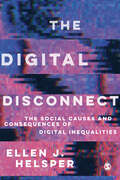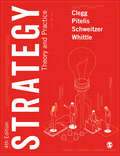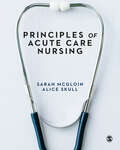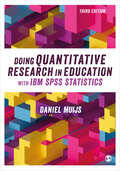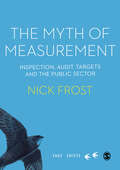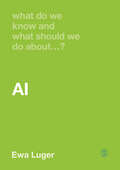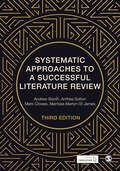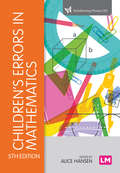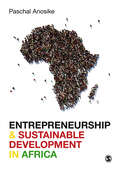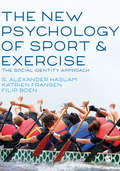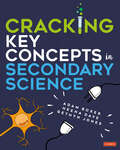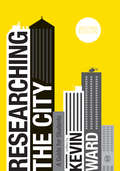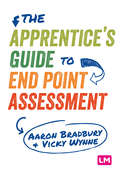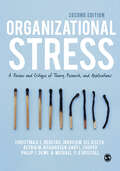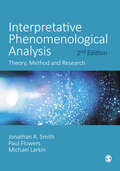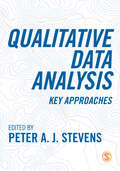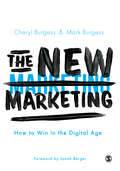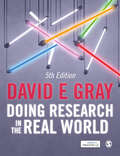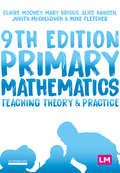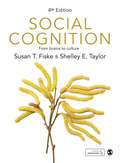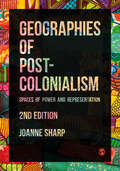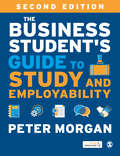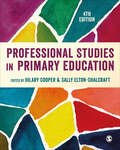- Table View
- List View
The Digital Disconnect: The Social Causes and Consequences of Digital Inequalities
by Ellen HelsperWith the increased digitisation of society comes an increased concern about who is left behind. From societal causes to the impact of everyday actions, The Digital Disconnect explores the relationship between digital and social inequalities, and the lived consequences of digitisation. Ellen Helsper goes beyond questions of digital divides and who is connected. She asks why and how social and digital inequalities are linked and shows the tangible outcomes of socio-digital inequalities in everyday lives. The book: Introduces the key theories and concepts needed to understand both ‘traditional’ and digital inequalities research. Investigates a range of socio-digital inequalities, from digital access and skills, to civic participation, social engagement, and everyday content creation and consumption. Brings research to life with a range of qualitative vignettes, drawing out the personal experiences that lay at the heart of global socio-digital inequalities. The Digital Disconnect is an expert exploration of contemporary theory, research and practice in socio-digital inequalities. It is also an urgent and impassioned call to broaden horizons, expand theoretical and methodological toolkits, and work collectively to help achieve a fairer digital future for all. Ellen J. Helsper is Professor of Digital Inequalities at the Department of Media and Communications at London School of Economics and Political Science.
Child Development for Early Years Students and Practitioners
by Sally NeaumThis accessible guide to child development is for students of degrees and foundation degrees in Early Years, Early Childhood Studies and related disciplines and for early years practitioners. *Introduces the context of child development *Develops an understanding of development and of how early years practitioners can support this *Explores the biological/social debate, and the importance of holistic development *Examines factors affecting development and includes a chapter on reflective practice *Considers the complexity of children′s development and argues that is is not always a straight forward progression This fifth edition: *is updated in line with the new EYFS and the updated Development Matters; *is updated to include child development learning from 0-8 *includes up-to-date guidance on assessment processes in the Early Years; *includes a new section with key knowledge on well known theories of child development.
Strategy: Theory and Practice
by Stewart R Clegg Andrea Whittle Jochen Schweitzer Christos PitelisWritten by an expert team and praised for its refreshing approach, this essential text offers a critical, holistic understanding of strategy theory and practice. The fourth edition has been fully updated to include: • Coverage of contemporary issues including the Covid-19 pandemic, climate change and digitalization • Topical and engaging case studies such as Disney’s Strategy and Covid-19, Netflix Versus Amazon: Dynamic Capabilities for Global Success, and PS5, Xbox and BMW: Chips and Supply Chains • A wealth of new examples of strategy in practice from world-renowned organisations such as Google, Uniqlo, Tesla, IKEA, and Airbnb Suitable for both undergraduate and postgraduate study, Strategy: Theory and Practice encourages readers to engage critically with the internal and external factors that shape strategy in the real world. A selection of tried and tested online resources, including a teaching guide, PowerPoints, an online case study bank and test bank of questions have been developed to support lecturers using the book in their teaching. Stewart Clegg is Professor at the University of Sydney, Emeritus Professor at the University of Technology Sydney, and Visiting Professor at the University of Stavanger, University of Johannesburg, and Nova School of Business and Economics. Christos Pitelis is Head of Department of International Business and Professor of International Business and Sustainable Competitiveness at the University of Leeds, and Life Fellow at Queens’ College, University of Cambridge. Jochen Schweitzer is an Associate Professor at the University of Technology Sydney. Andrea Whittle is Professor of Management at Newcastle University Business School.
Principles of Acute Care Nursing
by Sarah McGloin Alice SkullTaking a structured approach that maps to the ‘ABCDE’ method of patient assessment, the book provides a one-stop-shop for nursing students that shows how to plan care for the acutely ill adult. The use of case studies and activities bring the book to life with clear and simple explanations of the relevant anatomy, physiology and pathophysiology helping to build a deeper understanding of acute illness and disrupted homeostasis. Key features: Adopts a patient-centred approach that considers the full context of care, the patient’s own view and psycho-social needs Blends the underlying science of health and illness with practical application Contains activities, case studies, illustrations and figures to support a wide range of learning styles
Doing Quantitative Research in Education with IBM SPSS Statistics
by Daniel MuijsThis essential guide for education students and researchers explains how to use quantitative methods for analysing educational data using IBM SPSS Statistics. By using datasets from real-life educational research, it demonstrates key statistical techniques that you will need to know, explaining how each procedure can by run on IBM SPSS Statistics. Datasets discussed in the book are downloadable, allowing you to hone your skills as you read. In this third edition, explanations have been updated with figures and screenshots from SPSS version 28, alongside a range of new research examples and updated further reading. Daniel Muijs is Dean of the Faculty of Education and Society at Academica University of Applied Sciences in Amsterdam.
The Myth of Measurement: Inspection, audit, targets and the public sector (SAGE Swifts)
by Nick FrostIn the public sector inspection regimes and performance targets provide a powerful and dominant narrative, often placing pressure on professionals and organisations to continuously quantify the quality of services and to achieve targets. This book explores the background, development, techniques and impact of such regimes across areas of the public sector including schools, universities, police forces, children’s services and health services. Putting inspection and audit regimes under scrutiny, the author questions their role and function across these organisations and builds a persuasive critical argument for the re-thinking of public accountability mechanisms and techniques.
What Do We Know and What Should We Do About AI? (What Do We Know and What Should We Do About:)
by Ewa LugerThe idea of Artificial Intelligence (AI) has taken the world by storm. From fears over killer robots in sci-fi dystopias, to driverless cars in real life, we are both inspired and horrified by the prospect of an advanced intelligence that is not our own. Could AI take over the world? Will it take all of our jobs? Has Google really created a sentient chatbot, and is AI racing towards human intelligence, or is it just horribly misunderstood? These common questions point us towards an unknown and troubling future. What we do know is that we are in the midst of a hype cycle, with huge amounts of funding and focus galvanising progress. Whether AI truly lives up to this hype remains to be seen, but this once niche idea has suddenly evolved into a global multibillion dollar industry. In this short and accessible book, Ewa Luger explains what we mean when we talk about AI, explores how we got here, describes what we are doing about it, where the field is heading, and where we should go next. ABOUT THE SERIES: The ‘What Do We Know and What Should We Do About...?′ series offers readers short, up-to-date overviews of key issues often misrepresented, simplified or misunderstood in modern society and the media. Each book is written by a leading social scientist with an established reputation in the relevant subject area. The Series Editor is Professor Chris Grey, Royal Holloway, University of London
Systematic Approaches to a Successful Literature Review
by Andrew Booth Anthea Sutton Mark Clowes Marrissa Martyn-St JamesWhether you are new to literature reviews or working with new types of data, this book takes the guesswork out of writing your literature review. From deciding how much literature to include to managing your data, assessing your sources, and writing results, it outlines a step-by-step process that works with any data. To help you choose best approach for your research, this book includes: · Worksheets and decision aids to help you plan and organise your literature review · Worked examples and case studies to show you what – and what not – to do in practice · Troubleshooting tips and answers to all your frequently asked questions · Online access to a literature review starter template, an exercise workbook, project diary template, and a source credibility checklist. The perfect project support for any social sciences student, this edition also includes a new chapter on analysing mixed methods research.
Children′s Errors in Mathematics (Transforming Primary QTS Series)
by Alice Hansen John Dudgeon Doreen Drews Liz Surtees Fiona LawtonThis practical and popular guide to children’s common errors and misconceptions in primary mathematics is an essential tool for you as a teacher or trainee. It helps you plan for and tackle potential errors and enhances your understanding of the difficulties encountered in mathematical development. Providing guidance on how to identify common misconceptions, it explores how common misconceptions can be anticipated and addressed. The book: Is linked to the new National Curriculum and covers every objective. Explores contemporary themes and approaches being used in primary classrooms and schools today. Covers mastery approaches to teaching mathematics, exploring ‘what is mastery’? Gives support around preparing children for new statutory times tables test with new content and a deeper exploration of children’s errors in multiplication. Includes intervention strategies and scenario sections.
Entrepreneurship and Sustainable Development in Africa
by Paschal AnosikeHigh foreign aid dependence, poor human capital, rising high youth unemployment and poverty are just some of the reasons that Africa represents such a striking symbol of global inequality today. In this book, the author draws on his research and experience of working with key stakeholders to explore how Africa can take advantage of the knowledge economy and 4th Industrial Revolution opportunities to rebuild from the Covid-19 pandemic and empower its people and encourage entrepreneurship. Entrepreneurship and Sustainable Development in Africa is a book the African political class, economic policy and development experts, the donor community, academic researchers and students of business and international development can rely on for a better understanding and solutions to Africa’s historical and contemporary socio-economic problems. Paschal Anosike is Associate Professor of Entrepreneurship and Innovation and the founding Director of Centre for African Entrepreneurship and Leadership (CAEL) at the University of Wolverhampton.
The New Psychology of Sport and Exercise: The Social Identity Approach
by S Alexander Haslam Katrien Fransen Filip Boen′The Roger Federer, the Steffi Graf, the Usain Bolt of all books about the psychology of sport, packed with insight and wisdom’ - Brian Viner, Sports writer and author of Pelé, Ali, Lillee, and Me This is the first textbook to explore and explain the contribution of social groups and social identity to all aspects of sports and exercise — from leadership, motivation and communication to mental health, teamwork, and fan behaviour. In the context of increasing recognition of the importance of group processes for athletic performance, engagement in exercise and the business of sport, this book offers a new way of understanding, researching and practicing sport and exercise psychology Written by an international team of researchers at the cutting edge of efforts to apply social identity principles to the world of sport and exercise, this will be an essential resource for students, teachers and practitioners who are keen to be at the forefront of thinking and practice.
Cracking Key Concepts in Secondary Science (Corwin Ltd)
by Adam Boxer Heena Dave Gethyn JonesThe perfect companion to help you crack some of secondary science’s most challenging concepts in your teaching. Secondary science teaching is a heroic task, taking some of humanity’s greatest discoveries and explaining them to the next generation of students. Cracking some of the trickiest concepts in biology, chemistry and physics, with walkthrough explanations and examples inspired by direct instruction, this book will bring a fresh perspective to your teaching. · 30 key concepts explored in depth · Understand what students should know before and after the lesson · Tips and tricks offer detailed advice on each topic · Checks for understanding so you can test your students’ knowledge Adam Boxer is Head of Science at The Totteridge Academy in North London. Heena Dave was Head of Science at Bedford Free School. Gethyn Jones is a teacher of physics at an independent school in London
Researching the City: A Guide for Students
by Kevin WardThis practical guide for students focuses on the city and on the different ways to research it. The authors explain how urban studies research is done, from the original idea to design and implementation, through to writing up and representation. Substantive chapters explain each method in detail, from using archival methods, interviews, ethnography, questionnaires, discourse analysis and diaries, to using GIS and visual methods. This second edition offers: · A thorough introduction to the research process · Revised and updated discussions of foundational methods · A new chapter on sensory methods · A new chapter on social media as an object or a method of studying the city. With real world examples throughout and guided further reading for each chapter, it is an inspiring guide for students carrying out their own research in urban geography, urban planning, urban sociology and urban studies.
The Apprentice’s Guide to End Point Assessment
by Aaron Bradbury Vicky WynneAre you preparing for Apprenticeship End Point Assessment? This book is an essential guide for apprentices and their trainers. It supports you to prepare for the Gateway and get ready for your EPA. It helps you to make sense of EPA and to understand the expectations of your assessors. Examples of good practice are included to help you learn from other apprentices. It details the different types of assessment used in EPA to help you prepare for, and be ready to succeed in, your EPA.
Organizational Stress: A Review and Critique of Theory, Research, and Applications
by Cary L. Cooper Philip J. Dewe Christina G. Nerstad Ingvild M. Seljeseth Astrid M Richardsen Michael P O′DriscollWhat price do organizations and nations pay for a poor fit between employees and their work environments? Negative stress imposes a high cost on individual health and well-being as well as organizational health and productivity. This comprehensive textbook examines the definitions of job-related stress and the methods used to assess levels and consequences of occupational stress, along with strategies that may be used by individuals and organizations to confront negative stress and its associated problems. From sources of stress to organizational interventions, and from job-related burnout to coping with stress, Organizational Stress gives the reader – whether researcher, student, or practitioner – a basis for tailoring work environments which contribute to the health and well-being of individuals, organizations, and even the societies in which they live. This new edition has been updated to reflect the most relevant research in the field of organisational stress, including a completely new chapter on stress and the brain. It also focusses on the future of work in our rapidly changing world – dealing with contemporary contexts such as the COVID-19 pandemic and the rise of the gig economy. Christina G.L. Nerstad is a Professor at BI Norwegian Business School Ingvild M. Seljeseth is an Associate Professor at Kristiania University College Astrid M. Richardsen is Professor Emerita at BI Norwegian Business School Cary L Cooper is a Professor at Alliance Manchester Business School Philip J. Dewe is Emeritus Professor at Birkbeck, University of London Michael P. O′Driscoll is Emeritus Professor at University of Waikato
Interpretative Phenomenological Analysis: Theory, Method and Research
by Jonathan A. Smith Paul Flowers Michael LarkinInterpretative phenomenological analysis (IPA) is a qualitative research approach committed to the examination of how people make sense of their major life experiences. This text provides a detailed guide to conducting IPA research, presenting the theoretical underpinnings of the approach, a comprehensive overview of the stages of an IPA research project, and examples of high-quality IPA studies. Extended worked examples from the authors′ own studies in health, psychological distress, and identity illustrate the breadth and depth of IPA research, making this book the definitive guide to IPA for students and researchers alike. New to this edition: - A thoroughly updated chapter dedicated to analysis - An exemplary mini-study - Improved and updated terminology - A chapter discussing innovations in design, data collection, and collaboration ′It is not often I can use "accessible" and "phenomenology" in the same sentence, but reading the new book, Interpretative Phenomenological Analysis…certainly provides me the occasion to do so. I can say this because these authors provide an engaging and clear introduction to a relatively new analytical approach′ - The Weekly Qualitative Report
Qualitative Data Analysis: Key Approaches
by Peter A. StevensWith numerous approaches to choose from, knowing where to start when doing qualitative data analysis (QDA) can be a challenge. This book gives you direction with an accessible and thorough introduction to nine different approaches to QDA, written by a multi-disciplinary team with years of experience teaching and analysing data using these methods. With a clear focus on the ‘how to’ of QDA, each chapter includes: •Step-by-step descriptions of how to apply each approach in your research •Online and in-text activities to help you practice your skills •Annotated reading lists so you can dig deeper into key topics •Case studies from a range of disciplines so you can see how each approach works in practice. The perfect companion on your journey through QDA, the book also offers a comprehensive introduction to the use of NVivo QDA software, helping both new and experienced researchers get to grips with the essentials.
The New Marketing: How to Win in the Digital Age
by Mark Burgess Cheryl BurgessIn our hyper-connected world that is changing at warp speed, marketers recognize the need to shift from traditional marketing methods to a new way that can help them better navigate the unpredictable environment. For traditionalists, this change has posed a challenge. Many have tried to incorporate new approaches into the old models they grew up with, only to be frustrated with the results. From the bestselling authors of The Social Employee, and LinkedIn Learning course authors, comes a powerful new textbook that cracks the marketing code in our hyper-focused digital age. The New Marketing, with contributions spanning CMO trailblazers to martech disruptors, behavioral economics luminaries at Yale to leading marketing thinkers at Kellogg and Wharton, is a GPS for navigating in a digital world and moves the craft of marketing through the forces of marketing transformation. We can’t predict the future. But our goal is to help make Masters/MBA students and marketing practitioners future-ready and successful.
Doing Research in the Real World
by David E GrayFrom first planning to writing up your research, this complete guide will help you push your project forward. Walking you through every step you need to take, it helps you build your knowledge of theory and methods and offers straightforward guidance to empower you to make good research decisions and learn best practice. This fifth edition: Draws on over 70 case studies of research in action to demonstrate potential pitfalls – and how to avoid them. Adds a new chapter on data management, providing how-to guidance on storing your research data. Provides more than 150 activities to help you develop your understanding of key concepts and advance your research methods knowledge. Illustrates how research methods skills transfer to the workplace, helping you boost your employability. Accompanied by online resources including videos, case studies and further reading that bring methods to life, this accessible book is still the definitive research companion for any student doing a research project.
Primary Mathematics: Teaching Theory and Practice (Achieving QTS Series)
by Claire Mooney Alice Hansen Mary Briggs Mike Fletcher Judith McCullouchAn extensive knowledge of the primary Mathematics curriculum is not enough for you as a trainee teacher, you need to know how to teach Mathematics in the primary classroom. This is the essential teaching theory and practice text for primary Mathematics that takes a focused look at the practical aspects of teaching. It covers the important skills of classroom management, planning, monitoring and assessment and relates these specifically to primary Maths. Practical guidance, features and resources help you translate your learning to the classroom and understand the wider context of teaching: - Online practical lesson ideas for the classroom - The Primary National Curriculum for Mathematics in Key Stages one and two - Tips for planning primary Maths - Useful weblinks for primary Mathematics teaching The ninth edition of this popular book includes a new chapter on ′Mathematics in the primary classroom′ exploring primary mathematics teaching today. It is also updated to include the new ′Ready to progress′ criteria.
Social Cognition: From brains to culture
by Shelley E. Taylor Susan T. FiskeThe social world is complicated and our minds are limited, so we take shortcuts. You have to make quick decisions – this person is dangerous, this one is not. The shortcuts we take mostly work well enough, because, after all, we survive. But some are deeply unjust, including racial or social class categories or other unfair stereotypes. This book will help you understand how these shortcuts work, why they exist, and how they are changing. There are examples in each chapter which * Show applications in the real world to help with your understanding * Highlight significant pieces of research to help you demonstrate knowledge of a wide range of sources * Explain researching in social cognition to improve your skills and give ideas for your own research. Check out the accompanying online resources for more.
Using the Law in Social Work (Transforming Social Work Practice Series)
by Robert Johns Jacqueline HarryA core function of social work is to assist, empower, and protect the most vulnerable in society. Social workers make difficult decisions in complex and challenging situations every day. They work in organizations that have clear statutory duties. Therefore, it is essential that social work students know what their responsibilities are. Familiarity with law, legislation, and legal processes is consequently fundamental to sound social work practice. This best-selling book will help you gain this foothold in understanding law as it applies to social work practice. It avoids complicated legal jargon remote from the everyday realities of practice, offering instead a grounding in legally-appropriate, rights-based social work. It covers the full range of social work law, including services for children and families and child protection, adult care law, youth justice, court work, professional regulation, and human rights.
Geographies of Postcolonialism: Spaces of Power and Representation
by Joanne P SharpExtensively revised, the second edition of Geographies of Postcolonialism introduces the principal themes and theories related to postcolonialism. Written from a geographical perspective, the text includes extended explanations of the cultural and material spaces of the colonial and postcolonial power and representation. Exploring postcolonialism through the geographies of imagination, knowledge and power, the text analyses the history of western representations of the "Other" and engages with the important conceptual contributions of postcolonial theory. Comprehensive, accessible and illustrated with learning features throughout, Geographies of Postcolonialism will be the key resource for students interested in the geographical and spatial dimensions of colonialism and postcolonialism. Jo Sharp is Professor of Geography at the University of St Andrews in Scotland.
The Business Student′s Guide to Study and Employability
by Peter MorganWritten in response to the pressures on universities to produce highly skilled and work-ready graduates and intended to map across a three-year business course, this book covers essential skills, from study, presentation and leadership to practical advice on securing that all-important job after university. A number of hands-on learning aids feature throughout, including: Skills self-assessment tables, ′For You to Do′, Integration and Application, Interview questions. This second edition has been thoroughly updated, and is complemented by a companion website featuring a range of tools and resources for lecturers and students, including an Instructor’s Manual and PowerPoint slides, answers and guidance on skills assessment tasks, templates and examples to download as well as additional online chapters on topics such as testing, assessment and alternative options for graduates. Suitable for all students taking a business degree.
Professional Studies in Primary Education
by Hilary Cooper Sally Elton-ChalcraftThis textbook gives you a broad overview of everything you will need to know to prepare for your initial teacher training and future career in the classroom. Covering practical issues including planning and assessment, and thought-provoking topics such as reflecting on your practice and developing critical thinking skills, this textbook provides you with an insightful exploration of the realities of teaching in primary schools. This fourth edition has been comprehensively revised and includes five new chapters on: · Teacher wellbeing · The Early Career Framework (ECF) · Digital literacy and primary schools after the pandemic · Growth mindset, dialogue and P4C · Learning outside the classroom This is essential reading for all students on primary initial teacher education courses including university-based (PGCE, BEd, BA with QTS), and schools-based (School Direct, SCITT, Teach First) routes into teaching. Hilary Cooper is Professor Emeritus of History and Pedagogy at the University of Cumbria. Sally Elton-Chalcraft is Professor of Social Justice in Education and also the Director of the Learning Education and Development Research centre in the Institute of Education at the University of Cumbria.
